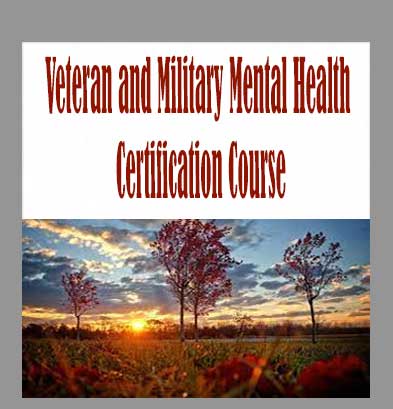
Description
Veteran and Military Mental Health Certification Course: Culturally Competent Treatment for Trauma, Moral Injury, Substance Abuse, Suicidality, and More download , Veteran and Military Mental Health Certification Course: Culturally Competent Treatment for Trauma, Moral Injury, Substance Abuse, Suicidality, and More revivew , Veteran and Military Mental Health Certification Course: Culturally Competent Treatment for Trauma, Moral Injury, Substance Abuse, Suicidality, and More free
Veteran and Military Mental Health Certification Course: Culturally Competent Treatment for Trauma, Moral Injury, Substance Abuse, Suicidality, and More
Treating clients with a military background is a whole other world…
…one that comes with its own culture, traditions, and challenges.
Are you asking the right questions? Have you gotten details about their service and what they experienced? Can you understand the basis of their values and beliefs and the pressure they face both internally and externally to uphold them?
This is critical information you need when approaching treatment.
Until now, it has been woefully misunderstood or outright ignored, and without it, you’ll miss your opportunity to create an effective alliance with your client.
That’s why we’ve developed this brand-new certification training, packed with everything you need to know to be effective with military and veteran clients. Renowned experts like George Faller, LMFT, Carrie Kennedy, PhD, ABPP, Michelle Flaum, EdD, LPCC-s, DCMHS, and more will give you in-depth tools, strategies, and techniques that will boost your confidence and get results.
They served for us, now let’s make sure we serve them and give the best care we can. REGISTER NOW!
When you register, you’ll get concrete strategies for better assessing your client’s needs, treatment planning tools, and powerful evidence-based techniques to help keep focus in session.
You’ll be able to build better rapport with your clients by understanding military moral and value systems, as well as transform trauma into growth and create positive change amid reactivity and fear.
Whether you work in or out of the DoD or VA, you’ve been seeing military and veteran clients for years, or just want to serve more of them — you can join the thousands of clinicians who have taken this important step to provide better, more effective care.
REGISTER TODAY!
Here’s What You’ll Learn
Section I | Military Culture
Understanding Military Culture:
A Guide for Behavioral Healthcare Providers
William Brim, PsyD
Your ability to have a positive impact on military service members and veterans hinges on whether you understand their culture. In this session, you’ll learn how to:
- Work within the customs, traditions, and ethos of military culture — whether you served yourself or not
- Modify behavioral healthcare to make therapy more useful
- Adapt the Cultural Formulation Interview for military and veteran clients
Culturally Competent Assessment of Military Service Members and Veterans
Carrie H. Kennedy, PhD, ABPP
If you don’t know military culture, you’ll miss your chance to form the strong relationships with your military and veteran clients that are the core of effective treatment. In this session, you’ll get:
- Tools to get an accurate history of your client’s military service
- Assessment techniques unique to service members to enhance rapport
- Strategies to improve case conceptualization and increase treatment efficacy
Caring for Self While Caring for Others:
Vicarious Trauma, Compassion Fatigue, and Burnout in Work with Military and Veteran Clients
Irina Wen, PhD
Working with military and veteran clients is meaningful and deeply rewarding, but witnessing suffering can result in vicarious trauma, compassion fatigue, and burnout. In this session, you’ll learn how to:
- Recognize essential signs of therapist stress
- Implement personal and organizational factors and strategies for prevention
- Effectively incorporate self-care in your practice and your life
Section II | Treatment Approaches
Mastering the Unified Protocol:
A Transdiagnostic Approach to Emotional Disorders
Shannon Sauer-Zavala, PhD
Military and veteran clients don’t fit into simple diagnostic categories and often struggle with more than one clinical issue alongside other psychosocial stressors. In this session, you’ll get:
- An evidence-based transdiagnostic protocol that fits most clinical problems
- Emotion-focused CBT strategies to improve clients’ symptoms and functioning
- Advanced tools to harness your clients’ motivation toward change
Crisis Response Planning and Lethal Means Counseling to Reduce Military and Veteran Suicide
Featuring Justin Baker, PhD, ABPP
Treating a client in a suicidal crisis is nerve-wracking enough on its own, but what if you’re working with a client who has access to and advanced knowledge of weapons? In this session, you’ll get:
- Two client-focused, evidence-based suicide prevention tools
- Strategies for conducting narrative assessments of suicide risk
- A tailored crisis response plan that prioritizes client self-management
Cognitive Processing Therapy (CPT) for Suicidality:
Overcoming Stuck Points and Creating Mental Flexibility
Kathleen M. Chard
CPT has rapidly become a top treatment for PTSD, and promising results now show it can impact key cognitive processes that may create lasting healing from suicidal ideation and behaviors. In this session, you’ll learn how to:
- Dispel common myths around suicidality among clients with PTSD
- Approach suicidality-focused “stuck points” from a CPT perspective
- Practice CPT interventions that are useful for suicidal clients
Exposure to Burn Pits:
Implications for Treating Medical Trauma in Military and Veteran Clients
Michelle Flaum, EdD, LPCC-s, DCMHS
Military and veteran clients may have been exposed to several medical traumas as they suffer from respiratory illness, neurological effects, cancer, reproductive toxicity, and more. In this session, you’ll get:
- Tools to help validate clients’ experiences of medical trauma
- Information on client risk factors for medical trauma
- Assessment and treatment strategies for clients who have been exposed to burn pits
Military Sexual Trauma:
How to Heal in the Face of Betrayal
Melissa M. Bradley-Ball, MS, NCC, BCETS, FAAETS
For many clients, the multiple layers of betrayal within military culture can often be more traumatizing than a sexual assault itself — and it’s a major contributing factor to the development of PTSD. In this session, you’ll learn how to:
- Assess clients’ experience of multiple components of betrayal trauma
- Construct a coping plan for clients in early treatment for military sexual trauma
- Utilize narrative therapy techniques to help clients process their experiences
Paths Through Moral Pain:
Psychological Flexibility As A Guide
Wyatt R. Evans, PhD, ABPP
Facing situations that conflict with personal values leaves your military and veteran clients carrying guilt, shame, and anger that you need to know how to address. In this, you’ll get:
- Mindfulness tools to cultivate compassion and forgiveness for self
- Cognitive defusion techniques to shift clients’ relationship to moral pain
- Strategies to help clients re-evaluate, realign, and release values
Trauma-Related Insomnia:
Effective Sleep Strategies for Military Personnel and Veterans
Colleen Carney, PhD
Meg Danforth, PhD
Untreated sleep problems wreak havoc on your ability to effectively treat clients, particularly when it comes to trauma-related insomnia in military service members and veterans. In this session, you’ll learn how to:
- Assess the impact of fear of sleep in traumatized clients
- Utilize stimulus control and sleep scheduling to change clients’ sleep behaviors
- Implement cognitive therapy strategies to decrease barriers to sleep
Rethinking Addiction:
The Integrative Harm Reduction Approach
Andrew Tatarsky, PhD
Many military and veteran clients use illegal drugs for pleasure, connection, and coping despite their interference with roles and functioning. Integrative Harm Reduction, an alternative to abstinence-focused treatment, provides a way to rethink the relationship with substances. In this session, you’ll get:
- A roadmap for promoting positive changes regarding drug use and other risky behaviors
- Tools to overcome the guilt and shame that can derail therapy
- Mindfulness-based strategies for sitting with uncomfortable urges and feelings
Eating Disorders in Military Populations:
Trauma and the Tape
Andrew Walen, LCSW-C, LICSW, CEDS-S
Risk factors for eating disorders are pervasive in military service — from the heightened emphasis on weight and size to constant demands for physical fitness and stamina, to repeated exposure to potentially traumatizing experiences. In this session, you’ll learn how to
- :Effectively screen and assess for disordered eating and related behaviors
- Utilize exposure and response prevention tools for fears about returning to “normal eating”
- Respond to clients’ eating-related fear of persecution by peers and leadership
The Chronic Pain Foxhole:
Strategies for Treating Pain in the Military and Veteran Populations
Benjamin M. Keizer, PhD, ABPP
Without a fundamental understanding of military culture and how service members and veterans view pain, therapists are unprepared to help clients manage the complex issues they face and have the highest quality of life. In this session, you’ll get:
- Insight into differences between military and civilian pain medicine and attitudes
- Effective nonpharmacologic methods for alleviating chronic pain
- Core components of an effective pain management plan
Concussion and TBI in Military and Veteran Populations:
A Toolbox of Interventions to Improve Cognitive Functioning and Quality of Life
Sherrie D. All, PhD
Though largely “invisible injuries,” traumatic brain injury and concussion history can severely complicate treatment, making cognitive rehabilitation skills an essential component of effective treatment plans. In this session, you’ll learn how to:
- Utilize evidence-based strategies to improve cognitive functioning
- Identify and treat functional neurological symptoms
- Improve clients’ self-efficacy as they understand the mind-body connection
Going Into the Fire:
Emotionally Focused Therapy (EFT) for Military and Veteran Couples and Families
George Faller, LMFT
Helping military and veteran families doesn’t have to be a daunting, overwhelming task. In fact, with a clear roadmap and the right tools, you can transform trauma into growth and create positive change amid reactivity and fear. In this session, you’ll learn how to:
- Befriend clients’ defenses to reach core vulnerable emotions
- Stay focused in session with powerful, evidence-based techniques
- Create loving, durable relationships and inspire resilience and hope
bonuses
Finding a Faster Way to Treat Trauma
Janina Fisher, PhD
Therapists are under constant pressure to provide short-term treatment for long-term issues. This session will give you neurobiologically-informed techniques including mindfulness, somatic, and cognitive interventions that directly address the neurobiological effects of trauma in a brief, phase-oriented therapy model.
The Collective Trauma of War
Patrick Dougherty, MA, LP
Focusing on the symptoms of PTSD is not enough when working with veterans. This session will give you an understanding of the importance of helping clients understand the larger society that wishes to forget the horrors of war and its shared responsibility for them, and how that reinforces their intense feelings of isolation and difficulty integrating back into the civilian world.
Frequently Asked Questions:
- Innovative Business Model:
- Embrace the reality of a genuine business! Our approach involves forming a group buy, where we collectively share the costs among members. Using these funds, we purchase sought-after courses from sale pages and make them accessible to individuals facing financial constraints. Despite potential reservations from the authors, our customers appreciate the affordability and accessibility we provide.
- The Legal Landscape: Yes and No:
- The legality of our operations falls into a gray area. While we lack explicit approval from the course authors for resale, there’s a technicality at play. When procuring the course, the author didn’t specify any restrictions on resale. This legal nuance presents both an opportunity for us and a boon for those seeking budget-friendly access.
- Quality Assurance: Unveiling the Real Deal:
- Delving into the heart of the matter – quality. Acquiring the course directly from the sale page ensures that all documents and materials are identical to those obtained through conventional means. However, our differentiator lies in going beyond personal study; we take an extra step by reselling. It’s important to note that we are not the official course providers, meaning certain premium services aren’t included in our package:
- No coaching calls or scheduled sessions with the author.
- No access to the author’s private Facebook group or web portal.
- No entry to the author’s exclusive membership forum.
- No direct email support from the author or their team.
We operate independently, aiming to bridge the affordability gap without the additional services offered by official course channels. Your understanding of our unique approach is greatly appreciated.
- Delving into the heart of the matter – quality. Acquiring the course directly from the sale page ensures that all documents and materials are identical to those obtained through conventional means. However, our differentiator lies in going beyond personal study; we take an extra step by reselling. It’s important to note that we are not the official course providers, meaning certain premium services aren’t included in our package:
Refund is acceptable:
- Firstly, item is not as explained
- Secondly, Item do not work the way it should.
- Thirdly, and most importantly, support extension can not be used.
Thank you for choosing us! We’re so happy that you feel comfortable enough with us to forward your business here.








Reviews
There are no reviews yet.